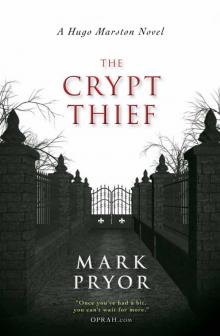- Home
- Mark Pryor
Dominic Page 13
Dominic Read online
Page 13
His eyes widened. “You serious?”
“Yeah. I mean, I’m sure it’s my imagination, but I keep seeing the same car and the same guy—but every time I look his way, he takes off. Not in a panicked way, he just . . . you know.”
“Dude, that is weird. You want me to make a report?” He pointed to his computer on the table where he spent most of his day, next to the screening machine and with a view of the parking lot. “I can do it right now.”
“No, I don’t think so. It’s probably just PTSD after almost being framed by that tool Bell. Paranoia, whatever you want to call it,” I said, miming embarrassment.
“I don’t know, Dom, I mean you’re a prosecutor. You gotta have pissed off a lot of people, no?”
“Maybe. I try to be fair, though. And I always imagine that people, defendants included, realize I’m just doing my job; it’s never personal.”
“Not for you, but for some criminal going to prison . . . Seriously, you should at least make a report.”
“Let me see if I can get a license plate first, or maybe a picture of the guy. I really don’t want to jump to conclusions.”
“If you’re sure. What do you need from me?”
“I was just going to ask you to keep an eye out. We’re all kind of sitting ducks, walking in from the parking lot.”
“Sure, of course. I’ll tell the other deputies, too.”
“Thanks, Mike. Oh, I was also wondering, do you have access to the same info the deputies do at the jail?”
“Yeah, it’s all on the computer system.”
“Great,” I said. “So you can look up release dates, which unit inmates are in, all that good stuff?”
“All of it,” he said. “I can tell you if they’ve had discipline issues, who their cellmates are, if they have dietary restrictions.”
“Perfect. And you won’t get in trouble for looking someone up for me, kind of a favor.”
“No, man, we’re good. They don’t keep track of that; and, even if they did, I don’t know anyone who’d mind.” He pulled out a pen and a small notepad from his top pocket. “What do you need?”
“I can’t believe it’s that simple.”
“It’s a new age, Dom.” He grinned. “Everything’s computerized, so it really is simple. I’ll print out what I find, bring it to you.”
I gave him the information, and he left his post at the entrance, nodding at his two colleagues to take over, then went into his small office down the hallway that led to the main courtroom. Sometimes things are that easy, I thought, and went back to my office.
Ten minutes later, Mike knocked on the door and waved a single piece of paper at me. “Just four cellmates; he wasn’t there long. Need anything else?”
“No, but thanks, I appreciate it.”
“You can just go online to the county website to see if any of them are still locked up, if that’s what you need.”
“Yeah, we use that inmate locator a lot,” I said. “You’d be surprised how often our witnesses don’t show up to court or meetings because they’ve been locked up on a warrant, or for beating their spouse.”
“Nah, man, I wouldn’t be surprised in the least.” He gave me a parting wave. “Keep your eyes peeled and holler if you need anything else.”
What I needed was for Sergeant Jeremy Brannon to leave me and my lady alone. To close the case on Bobby and go about finding all the other bad guys rattling around my growing city. What I needed, and planned to make sure I got, was a dramatic, all-out display that I was the victim in that case, then and now.
But first things first. At lunch I bought myself a brand-new computer, small enough to fit in my already-full bag, and cheap enough that I could pay for it in cash. I sat in the break room and ran searches on the four names that Trejo had given me. First up, Ricardo Sotolongo. According to the Travis County website, he was still locked up in Del Valle, so he wasn’t a candidate. Next up was Travis Lee White, who had apparently been released. Duly noted. A Web search didn’t come up with any news stories or other information about Mr. White, so I put him aside for the moment.
The third name was Jose Gutierrez. I typed that into the search box, and it gave me three hits, one of whom matched the date of birth on Trejo’s printout. Still locked up. Or locked up again, judging from the recent booking date.
The fourth name was John Eastcott, a gentleman who had been released from Del Valle Correctional Facility some months ago, in a body bag. According to the Statesman, some unpleasantness had arisen among a few inmates, and Mr. Eastcott had been taken to task for his racially insensitive views. Taken to task by three fellow inmates bearing shivs.
Which left just me and Travis Lee White. I had no idea who he was or what he’d done to wind up in a cell with Tristan Bell, but if, sometime down the road, the police investigated him for stalking me, I’d like to find out a little about him on my own.
Well, maybe with some help from my good friend Brian.
CHAPTER SIXTEEN
I slapped the desk in frustration, making McNulty jump. “Jeez, Dom, you’ll give me a heart attack,” he said.
If that’s all it takes, I thought, but said, “Sorry, old chap, I swear my Versadex account is jinxed. It’s like every fifth report I try to run gets jammed up. Very frustrating.”
“You’re the computer whiz around here, so don’t ask me to fix it.”
“I’m wondering whether it’s a hardware or software problem.”
“No clue. Want me to run something for you?”
“Yeah, please. Wait, no. Mind if we try something?”
He tore his eyes away from his Facebook feed and looked over at me. “Try something?”
“Yeah. I log into Versadex using your username and password but on my computer. Then I try and run a report. If it works, then I know it’s my account that’s screwed. It if doesn’t work, then it’s the computer somehow.”
“I guess,” he said.
“Right? Makes sense to me.”
“Except, I can’t give you my info to log in. Remember? We signed that user agreement with Austin PD saying we’d keep it confidential.”
“I don’t think they meant from each other,” I said, as patronizingly as I could.
“Well, I’m pretty sure so. They like to keep a record of everyone who logs in, what they look at. You know, store that info.”
“So?”
“So,” he said, as if I were the dolt, “if we’re all using each other’s accounts, that information would be incorrect. Useless.”
“Fine.” I sighed and stood up. “If you really think so. You can log in, I won’t look.” I made a show of moving away from my desk and turning my back to him as he went over to my keyboard.
“There,” he said a moment later. “I’m in. what do you need?”
“Let’s just see if it works. Go to your history and print the last report you pulled up. The last short one;—we don’t need to be destroying trees for this little experiment.”
I turned and saw the offense report appear on my screen. “Works fine,” he said. “Does that mean it’s your account that’s corrupted somehow?”
“I think so. I’ll put in a work order for them to look at it.”
“Can I log out of here now?”
“Yes, thank you.” I gave him a grin. “And no user agreements violated; what good little prosecutors we are.”
“I am,” he said. “They can thank me.” Then he got off his high horse and added, “After all, prospective judges can’t be swapping passwords and pissing off the cops, eh?”
“Very true, I really shouldn’t be.”
He snorted on his way back to his desk. “Good one, Dom. If you’re lucky, it’ll be your turn next time.”
“Right. I forgot.” I waited until he’d turned back to his social media before picking my phone up from the stack of law books beside my computer. I stopped the video recording, turned the volume all the way down, and replayed the last two minutes. Brian’s fat fingers stabbed at the keybo
ard, fast enough that I missed his username and password the first time around, but slow enough that I got them on the second showing.
As much as I wanted to do it right there and then, I knew I had to wait until he left the office. If Versadex somehow showed two Brian McNultys logged in at the same time, well, that might raise a suspicion or two. The clocked ticked slowly past the three o’clock hour, and then slowed until it hit four. Brian didn’t notice for ten more minutes.
“Right,” he said finally. “That about all the justice I can dispense for one day.”
“The world’s a better place. Nice work.”
He gathered his Doctor Who lunchbox and his computer bag, then gave me a thumbs-up as he left, saying, “See ya for more of the same tomorrow, mate.”
“You bet,” I said, through gritted teeth. “Mate.”
I made sure he was gone and didn’t come back, like for his Teletubbies water bottle or whatever. Then I logged on as Brian McNulty and put Travis Lee White’s name and date of birth into Versadex.
And if I’d believed in God, I would’ve thanked him.
Travis White was a loser. Not in the dorky, annoying way that Brian was a loser, but in the way that life had kicked him in the balls and he’d crumpled, lying in a heap on the ground and unable to get up as everyone in sight put the boot in, making sure that he never truly recovered.
Twenty-seven contacts with Austin police in the last five years, some as a victim, a couple as a witness, and nineteen as the suspect. You name it, he’d done it. Possessing marijuana, trespassing on private property, shoplifting, assault. It was a gently arcing, one-man crime wave, and the beauty of it was that it showed a slight but unmistakable escalation. From property crime to misdemeanor assault, to felony evading in a motor vehicle, then unlawful carrying a firearm, followed by robbery, his latest.
I studied his mug shot. A stocky man with pale skin and tattoos up his neck, jail tattoos of such shitty quality that I couldn’t read them. He had a buzz cut and a goatee that was way too long, a scraggly, wiry waterfall disappearing down and out of the picture. His eyes looked black and disinterested, and I wondered about him. They say that 25 percent of inmates are psychopaths, as opposed to about 1 percent of the regular population, but I’d not much cared until now. Even if he was, most of them were idiots, and, given the number of times he’d been caught and jailed, any lack of soul was likely to be matched by a lack of wits.
The most recent address for him was an apartment complex close to downtown, one I’d heard of: Meadowbrook Apartments. Again, no meadows or brooks to be found there, just poor families, criminals, and kids throwing rocks at each other. Cops called it “Murderbrook” for all the gang activity and warrants they served on the place. Ironically, the entire neighborhood around it was bristling with gentrification, fancy homes crammed into small lots, such that the nearby elementary school was half filled with kids delivered in Land Rovers and Teslas, while the other half were walked down South Fifth Street by parents in flip-flops and pajamas.
Of all the projects in Austin, then, it wasn’t the worst to live in, and I thought I knew where to start learning a little more about my subject. I phoned the management office at Meadowbrook and put on my most official voice, toning down the accent because it sometimes threw people a little, when I asked after Travis White. The woman on the other end hesitated.
“Travis County DA’s office, you said?”
“Yes, ma’am.”
“And your name again?”
“Brian. Brian McNulty,” I lied. For no particular reason, and I instantly wished I hadn’t.
“You know, I don’t think I can give that information out over the phone. If you had a warrant or something . . .”
I knew she was unsure and just throwing out words she’d heard on Law & Order, but I stayed friendly. “Oh, I’m not looking to search his place or anything like that, just confirm he lives there, and which apartment.”
“I don’t think I can. Can you tell me why?”
“Not really,” I said. “State secret.” I know irrelevant buzzwords, too.
“Oh. Well, sorry.”
“Hmm. How about this. I won’t ask for any specific information, but if he lives in the complex, maybe you don’t hang up. If he doesn’t live there anymore, you hang up straight away.”
“Oh, I guess . . .” Silence came down the line for a good ten seconds.
“Well,” I said. “Thank you so much for your cooperation, and your professional discretion, I appreciate it very much. One last thing. Do you guys have security cameras on the premises?”
“No. We used to, but people would either vandalize them or steal and resell them, so we stopped replacing them. None left.”
“That’s a shame. I’m seeing a lot of crime in that area. What about security guards?”
“Only until two in the morning, starting again at six.”
“Good to know. Thanks again for the help.”
So he still lived there. The police report I’d read didn’t give a specific apartment number, so I thought for a moment, then grabbed my keys and went out to my car.
I turned right on South Congress, then left on Oltorf to South Fifth to Mr. White’s closest library. The Twin Oaks Library was classic Austin. Its books represented Austin’s artistic community, of course, but the building itself was also typical of the city: the exterior was made of recycled bricks, while the inside featured recyclable carpeting and furniture fabrics and had a sophisticated lighting system that automatically dimmed when there was sufficient daylight.
At the circulation desk, I showed my badge and official Travis County ID. I also flashed my brightest smile at the prettier of the two girls working there.
“Hi, I’m from the Travis County District Attorney’s Office; I wonder if you can help me?”
Her eyes lit up. “Sure, what do you need?”
I gave her a conspiratorial wink and lowered my voice. “It’s a little sensitive.” I looked around at the many patrons milling around. “Can we talk over here?”
Without waiting for an answer, I moved to the reference section, which was empty except for an older man wearing gigantic earphones.
Her name tag said Rose, and she was a cute little thing with ponytails and no makeup. She had tattoos on her arms, brown ones drawn in henna.
“What is it?” she asked, a little wide-eyed.
“So we have this new program, kind of a community-outreach thing. We’re trying to move away from the traditional model of criminal justice and rehabilitation. You know, good guys versus bad guys and as much prison time as possible. Totally outdated,” I said. “And utterly ineffective.”
She clasped her hands together. “Oh, my God. I’m so glad to hear you say that. The prison industrial complex is a moneymaker for private enterprise. It’s cashing in on the misery of those who need the most help.”
Whatever. “Yes! I totally agree. More to the point, my boss agrees. Anyway, I’m supposed to help a particular gentlemen who, just between us, has been through the wringer. I’ve been here a few times to meet him, I don’t know if you’ve noticed.”
She seemed caught out, uncertainty in her eyes. “Err, no, I don’t think . . . I must not have been here.”
I gave her a lingering look. “Oh, you were here, I noticed you all right.”
She blushed, and may even have peed herself, I wasn’t sure. “Oh, I’m sorry. I can’t believe—”
“Oh, it’s OK. The thing is, my guy, the one I’m supposed to help, didn’t show up either time. I didn’t want to ask publicly, you know, make it obvious that he’s a . . . you know.” A worthless criminal.
“Right, no, of course,” she gushed. “Wow, that’s so sensitive of you.” She frowned. “I don’t know how to help, unless you feel like you can tell me his name, maybe what he looks like?”
“Well,” I hesitated. “I guess I can do that. I mean, if you saw us together now you’d know, and we’re both county employees, right? It’s not like you’d ever s
ay anything to him about this.”
“Oh, God, no, never,” she reassured me hurriedly.
“I know, for sure. So, his name is Travis.” I pulled a piece of paper from my jacket pocket and showed her his mug shot. “Travis White,” I said. “Do you recognize him?”
The chances were good. As much as local authorities liked to hack away at library budgets, they remained lifesavers for the dregs of society. They provided books for those who could, and wanted to, read; but, more importantly, they provided for free the kinds of resources that a lot of poor people couldn’t afford. Most notably, the Internet. Also, I knew that this library provided job assistance, including résumé writing and online applications at nearby businesses, mostly restaurants and big-box stores like Wal-Mart.
And, according to the library’s website, the delightful Rose McCracken upon whom I was shamelessly pouring the charm, happened to be one of the three librarians designated the task of overseeing these resources.
“Yes!” she exclaimed, then shushed herself. “Sorry, but yes. He usually comes in around six. Not every day, but most.”
“Oh, great.” I checked my watch. “Maybe I’ll come back. Does he have a car, or walk?”
“He has an older car,” she said. “Red, a Honda I think.”
“And you close at nine?”
“Yes. You want me to tell him you were here, that you’re coming back?”
“No, if you do that he’ll know you know . . . I don’t think we want to risk embarrassing the guy.”
“Oh, right, sorry.” She rolled her eyes at herself. “I can’t believe I suggested that.”
“No,” I said. “You’ve been so helpful, I really appreciate it.”
“Oh, you know what? He comes to an AA meeting here on Wednesday nights. Seven o’clock in the large conference room.”
I gave her another warm smile, and her mouth opened as if she wanted to say or ask something, but she didn’t. I squeezed her arm warmly and walked out of the library to my car.
CHAPTER SEVENTEEN
The next morning I was in court, tucked behind my prosecutor’s table as another slew of unrepentant kids shuffled in front of Judge Portnoy. She normally handled only the serious cases, but every now and again she presided over a docket of regular cases, the marijuana-possession and shoplifting tripe I saw every day.

 The Book Artist
The Book Artist The French Widow
The French Widow Hugo Marston 04 - The Reluctant Matador
Hugo Marston 04 - The Reluctant Matador The Crypt Thief
The Crypt Thief Dominic
Dominic The Bookseller
The Bookseller The Sorbonne Affair
The Sorbonne Affair Hollow Man
Hollow Man The Paris Librarian
The Paris Librarian